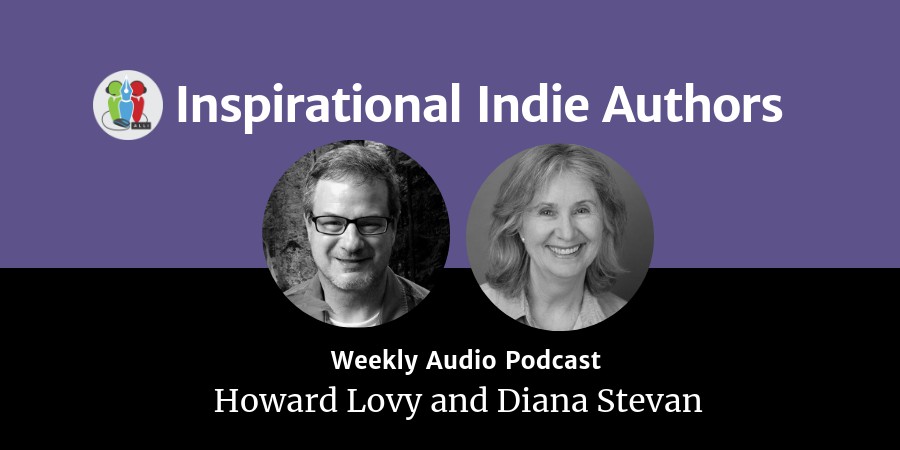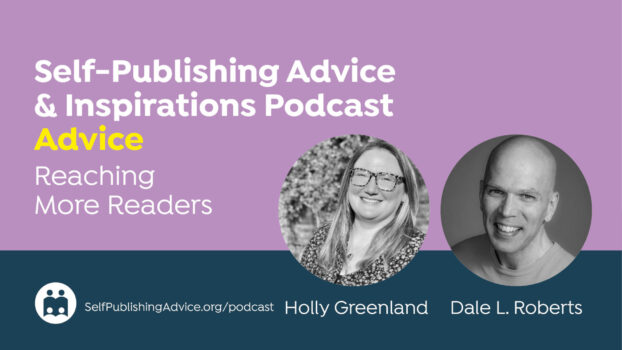Diana Stevan is in her 70s and is beginning to hit her stride as a prolific indie author of novels about family, love, and relationships.
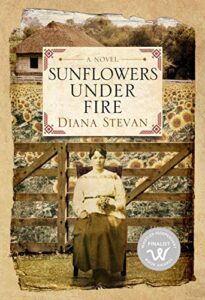 Her third self-published book, called Sunflowers Under Fire, is set in WWI and the Bolshevik Revolution. It's based on stories told to her by her mother and it's a finalist for the 2019 Whistler Independent Book Awards, sponsored by the Writers Union of Canada.
Her third self-published book, called Sunflowers Under Fire, is set in WWI and the Bolshevik Revolution. It's based on stories told to her by her mother and it's a finalist for the 2019 Whistler Independent Book Awards, sponsored by the Writers Union of Canada.
Diana is able to draw on a wide range of experience, from working at a meat-packing plant to an actress and model—but most of all as a family counselor—to accurately portray people in difficult circumstances.
A few highlights from our interview:
On Her Book as an Immigrant Story
And then I've also had another response from a woman in Texas who told me that this reminds her of the immigrant situations happening in the States, and it makes her more conscious of the desperation they go through, the choices they have to make to leave the land that they love.
On Her Experience as a Family Therapist
So I saw everyone from janitors to millionaires. I counseled lawyers and accountants. I was exposed to a breadth of people with different stories to tell. Now that I'm a storyteller, I have lots to draw on in terms of some of the human condition and how we grapple with the things that come our way in our lives. I mean, it's not easy, right?
If you haven’t already, we invite you to join our organization and become a self-publishing ally. You can do that at http://allianceindependentauthors.org.
Listen to My Interview with Diana Stevan
Don't Miss an #AskALLi Broadcast
Subscribe to our Ask ALLi podcast on iTunes, Stitcher, Player.FM, Overcast, Pocket Casts, or Spotify.
OR, sign up to get notified via email right when a broadcast is about to go live on Facebook and when a new podcast is published (#AskALLi advice on Wednesdays and indie inspiration on Sundays).
On Inspirational Indie Authors, @howard_lovy talks to @DianaStevan, who is in her 70s and just beginning to hit her stride as a prolific author who draws on a deep well of experience. Click To TweetAbout the Host
Howard Lovy has been a journalist for more than 30 years, and has spent the last six years amplifying the voices of independent publishers and authors. He works with authors as a book editor to prepare their work to be published. Howard is also a freelance writer specializing in Jewish issues whose work appears regularly in Publishers Weekly, the Jewish Daily Forward, and Longreads. Find Howard at howardlovy.com, LinkedIn and Twitter.
Read the Transcript
Howard Lovy: Diana Stevan is in her 70s and is just beginning to hit her stride as a prolific indie author. Her third self published book, called Sunflowers Under Fire is set in World War One and the Bolshevik Revolution. It's based on stories told to her by her mother, and it's a finalist for the 2019 Whistler Independent Book Awards sponsored by the Writers Unit of Canada. Diana is able to draw on a wide range of experience from working at a meatpacking plant to an actress and a model, but most of all, as a family counselor to accurately portray people in difficult circumstances.
Diana Stevan: I'm Diana Stevan, and I'm an author of three novels and a novelette but I didn't get here overnight, and I started writing novels quite late in my life. I guess I see myself as a Jill of all trades. Some people have suggested that maybe I'm a renaissance woman, and I never quite understood why they would say that but then when I look at my work career, I started out working at age 15.
I worked as a cashier, a baker's helper, later worked in a meatpacking plant skinning weiners, that was a university job in the summertime and got married, after my third year of a home economics degree, and then graduated when I was seven months pregnant with my Bachelor of Science in home economics honors and then another child came along, and we had two children. And then I decided to go back my Masters of Social Work, and became a family therapist for 25 years. And during those 25 years, I burned out twice and had two other different kinds of jobs working as a life insurance agent and another time working at CBC as a freelance TV reporter for Sports Journal. It was a local show in British Columbia covering athletes.
Howard Lovy: But wait, there's more.
Diana Stevan: And I have to add, I was also professional model. I did, in Winnipeg, I, you know, and that was a time when they had no agents. And so I did that on my own sort of, as well as doing the clinical work, because you know, modeling isn't a full time thing you get called off. But anyway, I did print ads, couturier shows, commercials. And then later, I also got into professional acting. So I've done series and movies of the week. And yeah, just, it's been a crazy life, Howard, crazy.
Howard Lovy: Translation: Diana's entire life has been book research. She has a deep well of experience from which she can draw material. But it was her work as a family therapist, where she learned about love, family, and other relationships, the stuff that makes characters come alive.
Diana Stevan: I loved my work as a family therapist. I graduated with a Master of Social Work in 1972. And I was very fortunate that my mentor at the University of Manitoba was a man who was a family therapist at the Wisconsin Mental Health Center for 10 years prior to coming to the university. So he inspired me to look at the family, you know, and how it impacted on the person's behavior. So at the time, this is back in 1972, I read every single article and book that was written about family therapy. So it was quite an interesting time. And I think, by delving into all of that literature in and then seeing firsthand, like working with families, and we videotaped them, and we studied video tapes about you know, we'd code the communication patterns, I mean, it was fascinating, Howard, I just lapped it up, it was an exciting time. So that certainly has given me lots of material.
So I saw everyone from janitors to millionaires. I counseled lawyers and chartered accountants, and it was short term counseling. But again, I was exposed to a breadth of people, like, with different stories to tell, you know, now that I'm a storyteller, you know, I have lots to draw on in terms of some of that, the human condition and how we grapple with the things that come our way in our lives. I mean, it's not easy, right? It's just not easy. Because my life has been, like, you know, all chopped up into all these different occupations that I pursue, I, you know, I tend to write in different genres as well. I don't know know, it's just my curiosity, I think, that takes me to all these different places.
Howard Lovy: Diana gets her inspiration from the stories of others. But also, because she's led such a diverse life, she draws on herself, and memories of her own emotions.
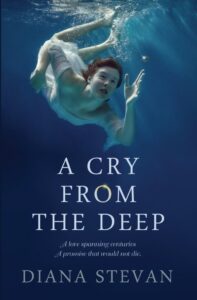 Diana Stevan: So in A Cry From The Deep, which is about an underwater photographer who is about to go on a treasure hunt for one of the lost ships of the Spanish Armada off the coast of Ireland. And but before she goes, she buys this antique ring and starts having nightmares and dreams of a woman from another time. So it's romance, it's mystery, it's adventure. But I drew on myself too, in terms of, you know, the feelings of what a woman might be going through when she's looking for love or had been disappointed in love or all of that. So yeah, but I had to do a lot of research for that one too. again, my curiosity. I've never scuba dived, I've snorkeled. So again, each of my three novels, I've had to do a lot of research. I love research because I'm learning. My second book was The Rubber Fence . And that was inspired by my first job as a clinical social worker in a psychiatric ward in Winnipeg.
Diana Stevan: So in A Cry From The Deep, which is about an underwater photographer who is about to go on a treasure hunt for one of the lost ships of the Spanish Armada off the coast of Ireland. And but before she goes, she buys this antique ring and starts having nightmares and dreams of a woman from another time. So it's romance, it's mystery, it's adventure. But I drew on myself too, in terms of, you know, the feelings of what a woman might be going through when she's looking for love or had been disappointed in love or all of that. So yeah, but I had to do a lot of research for that one too. again, my curiosity. I've never scuba dived, I've snorkeled. So again, each of my three novels, I've had to do a lot of research. I love research because I'm learning. My second book was The Rubber Fence . And that was inspired by my first job as a clinical social worker in a psychiatric ward in Winnipeg.
And I arrived there in 1972, all excited about doing family therapy and discovered that that wasn't so easy, because of the hierarchy on this ward, but I've chosen not to have my protagonist is a social worker. She's a psychiatric intern, who, you know, is very passionate about the work she's doing and discovered that there's shock treatment still going on. And this if you recall, this was around the time when One Flew Over the Cuckoo's Nest came out. And so there was a lot of shock, I guess, from the public as to what was really going on in these insane asylums. And I had just come up with family therapy, which at that time was looking at the family as being a factor in people's mental illness.
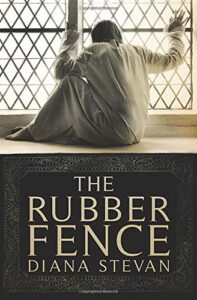 So I arrived there all excited and naive about the role of drugs in treatment and the role of shock treatment in depression and anyway, I was quite traumatized, Howard, by the nine months I worked on the ward. Well, you know, recently there was a screenplay called Shrink Proof, and I had an agent in Toronto, an agent in Vancouver and my agent in Toronto sent it up to Meg Ryan and to Jodie Foster's agent and Jodie Foster's agent loved it. But then Jodie passed on it. And so I decided to, like, put it on the shelf. And then, you know, years later I resurrected it, and wrote it as a novel.
So I arrived there all excited and naive about the role of drugs in treatment and the role of shock treatment in depression and anyway, I was quite traumatized, Howard, by the nine months I worked on the ward. Well, you know, recently there was a screenplay called Shrink Proof, and I had an agent in Toronto, an agent in Vancouver and my agent in Toronto sent it up to Meg Ryan and to Jodie Foster's agent and Jodie Foster's agent loved it. But then Jodie passed on it. And so I decided to, like, put it on the shelf. And then, you know, years later I resurrected it, and wrote it as a novel.
Howard Lovy: And now we can talk about her most recent book Sunflowers Under Fire, which is based on stories about her grandmother's experiences during World War One and the Russian Revolution.
Diana Stevan: My grandmother had three grandchildren now and over time, you know, during their growing up years, I've told little stories about my Baba, my mother, Lukia Mazurets. And I guess the anecdotes, which are stories I got from my mother about my grandmother were interesting to my children, especially my oldest granddaughter, Chloe, and Chloe said, “You know, Bubby,” she called me Bubby. “You know, you should write this book.” And so I thought, maybe I should. So I had all of these stories my mother had told me on my computer, I had been collecting them over the years. Every time I visited my mother, I would take my laptop, and she would repeat those stories. And I would try to keep them straight by writing them down on my laptop, you know, for family history. And so I had, you know, over 100 pages there of, you know, stories. Well, it starts with my mother's birth, you know, and my mother would tell me about her birth that her mother told her about. And when my mother, my grandmother was giving birth to my mother, her husband was in Lutsk, that was in Russia at the time, now in Ukraine. And he was in Lutsk volunteering to fight for the Czar's army. So here she is in her little farm cottage, about to deliver her eighth child.
And he's away in the neighboring city volunteering to go on and fight which, you know, really made her angry because she knew the Germans and Austrians were about to invade their area and what was she going to do without a husband to help her and protect her and so that's how the novel starts. And then we move into, you know, her having to flee into a refugee camp while her home burns. And so we go through, you know, her trials in the refugee camp and how she fared with, that was her eight child she had, but she lost two so actually, she fled with six children, and refugee camp and the typhus epidemic and the Bolshevik Revolution, and, you know, the Polish occupation. So, you know, and there were losses and and there were also joys, you know, a few weddings. So, it was all of that, it was such a joy to write this story and I discovered my Baba in the end in a way that I never knew her.
I mean, I shared a bedroom with her for the first 15 years of my life. But, you know, I didn't know, she never talked about what happened in the old country at all to me, and I never heard her say anything about it. And I never saw her cry either, which sort of was astounding after I delved into her history more. But I think it was, you know, much like, you know, we, those soldiers who come back from war, and they don't talk about what they experienced and what they saw, what they went through, because I think for them it would be to reawaken those wounds, and to go through that pain all over again, you know.
Howard Lovy : Sunflowers Under Fire is also an immigrant story and a universal story that many can identify with.
Diana Stevan: One woman said to me, “She reminds me of my grandmother, a strong woman, who, you know, toiled, you know, sort of anonymously, and no one knows about how hard she worked, and what she went through in her life.” And she reminded me of that strong spirit that a lot of these women who are not educated who don't, you know, have wealth behind them, and what they have endured and how they have, what they sacrificed to raise their families. So I've had that. And then I've also had another response from a woman in Texas who told me that this reminds her of the immigrant situations happening in the States, and it makes her more conscious of what people, the desperation they go through, in order, the choices they have to make to leave the land that they love.
I mean, my story, basically, you know, ends when, you know, my Baba wants to come to Canada, so, you know, and it's not an easy decision. And it's quite an interesting story about how she, how many people want to come and how many couldn't do it. And what she had to do to make that choice to leave the land that she loved, and the language that she knew and, and the family she had to leave behind. And so, you know, I think it is touching people in that way, Howard, and I'm thrilled because I never expected that.
Howard Lovy: Diana is still writing and working on her new book, one on her grandmother's immigrant experience in Canada. Her advice for other writers, “Just keep writing.”
Diana Stevan: But I think if people are looking to write, just to read a lot, I believe in reading a lot and to write even if, you know, you just, because not everything you write is brilliant or wonderful and writing is rewriting and rewriting and rewriting and not giving up, I think.

